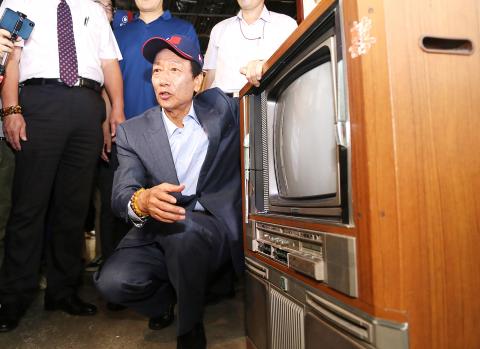Hon Hai Precision Industry chairman Terry Gou has thrown his hat into the ring to contest the Chinese Nationalist Party (KMT) presidential primary. The business tycoon once remarked that “Democracy doesn’t put food on the table,” which was criticized at the time by President Tsai Ing-wen and triggered a war of words among netizens. Without getting bogged down in the finer details of the correlation between democracy and economic growth, is it true — as Gou asserts — that the public are struggling to make ends meet to the extent they don’t have enough to eat? In reality, nothing could be further from the truth.
In the past few years, Taiwan’s economy has been relatively stable and has not experienced boom or bust. This is borne out by the economic data. Between 2016 and 2018 , Taiwan’s GDP grew by an orderly 1.51, 3.08 and 2.63 percent per year. Per capita GDP for last year was US$24,971, ranked 35th in the world, higher than China or India, but lagging behind Japan, South Korea, Singapore and Hong Kong.
However, if per capital GDP is calculated using purchasing power parity, which takes into account cost of living and inflation, Taiwan moves up to 19th place, overtaking both Japan and South Korea.

Photo: CNA
照片:中央社
In other words, while Taiwan’s economy is not going gangbusters or charging forward like a hot knife slicing through butter, neither is it in recession, nor is the general public destitute and struggling to feed itself, as Gou has intimated. However, with a presidential election looming in January, some are seeking to manufacture a brouhaha over the economy and are singling it out for attack.
Will Gou’s brand of populist rhetoric have the desired effect? To some extent it will have an impact: while the domestic economy continues to grow, real salaries are not increasing. Meanwhile, food and beverage costs are going up every year. If the electorate is left with the general impression that they are being sucked dry, this could easily morph into a wider feeling of discontentment onto which may be projected a sensation of not having eaten one’s fill.
Central to modern democratic government is the concept of one-person-one-vote, with each vote being of equal value. Democracy is a way of life and a specific ordering of political power, rather than an ideology in and of itself. If, as Gou says, “Democracy doesn’t put food on the table,” does this mean that if we dispense with democracy we can all be rich? The answer should be self evident.
(Translated by Edward Jones, Taipei Times)
鴻海精密執行長郭台銘要出馬角逐國民黨總統初選,他過去「民主不能當飯吃」的言論,引起總統蔡英文的反擊與網路多方論戰。姑且不論民主與經濟發展的距離為何,但把台灣當前經濟情況說到民不聊生、連飯都吃不飽的地步,這就與事實相差太遠。
坦白說,台灣這幾年經濟表現尚屬平穩,並沒有大起大落,根據統計,二○一六至二○一八年國內生產毛額成長率依序為百分之一點五一、百分之三點○八及二點六三。若以人均國內生產毛額成長率來看,去年為兩萬四千九百七十一美元,在全球排名三十五,高於中國、印度等國,但落後日、韓、星、港。
不過,若以生活費用及通膨的「購買力平價」算出的人均國內生產毛額成長率,台灣一舉拉高到全球第十九名,超越日本及南韓。
也就是說,台灣目前景氣雖然不是一飛沖天、勢如破竹,但絕對沒有落到經濟衰退、民不聊生的貧困局面,與吃不飽的說法還相差太遠;不過,就因為明年一月要總統大選,經濟情況就被拿來大做文章與攻擊。
這種庶民語言有沒有效果呢?其實,多多少少會有,國內經濟雖然持續成長,但民眾實質薪資不漲,荷包沒增加,民生餐飲費用卻年年提高,這種相對剝奪感,很容易轉化為不滿情緒及吃不飽的心理投射。
所謂的民主政治,就是一人一票、票票等值,這是一種生活方式與政治權力運作結構,絕非一種意識形態;試問,若民主不能當飯吃,難道沒有民主就可以發大財嗎?答案已經不言而喻。
(自由時報記者王孟倫)
讀後練習
Follow up
Questions (True or false)
1. It has been decided that Hon Hai Precision Industry chairman Terry Gou will be the Chinese Nationalist Party’s (KMT) candidate at next year’s presidential election.
2. Depending on how GDP per capita is calculated, between 2016-2018 Taiwan’s economy outperformed China, India, Japan and South Korea.
3. The author believes politicians are correct to focus on poor economic performance prior to the coming presidential election.
4. The author disagrees with Gou’s statement that democracy doesn’t fill stomachs.
(Edward Jones, Taipei Times)

In an effort to fight phone scams, British mobile phone company O2 has introduced Daisy, an AI designed to engage phone con artists in time-wasting conversations. Daisy is portrayed as a kindly British granny, exploiting scammers’ tendency to target the elderly. Her voice, based on a real grandmother’s for authenticity, adds to her credibility in the role. “O2” has distributed several dedicated phone numbers online to direct scammers to Daisy instead of actual customers. When Daisy receives a call, she translates the scammers’ spoken words into text and then responds to them accordingly through a text-to-speech system. Remarkably, Daisy

Bilingual Story is a fictionalized account. 雙語故事部分內容純屬虛構。 Emma had reviewed 41 resumes that morning. While the ATS screened out 288 unqualified, she screened for AI slop. She could spot it a mile away. She muttered AI buzzwords like curses under her breath. “Team player.” “Results-driven.” “Stakeholder alignment.” “Leveraging core competencies.” Each resume reeked of AI modeling: a cemetery of cliches, tombstones of personality. AI wasn’t just changing hiring. It was draining the humanity from it. Then she found it: a plain PDF cover letter. No template. No design flourishes. The first line read: “I once tried to automate my

Every May 1, Hawaii comes alive with Lei Day, a festival celebrating the rich culture and spirit of the islands. Initiated in 1927 by the poet Don Blanding, Lei Day began as a tribute to the Hawaiian custom of making and wearing leis. The idea was quickly adopted and officially recognized as a holiday in 1929, and leis have since become a symbol of local pride and cultural preservation. In Hawaiian culture, leis are more than decorative garlands made from flowers, shells or feathers. For Hawaiians, giving a lei is as natural as saying “aloha.” It shows love and

1. 他走出門,左右看一下,就過了馬路。 ˇ He walked outside, looked left and right, and crossed the road. χ He walked outside and looked left and right, crossed the road. 註︰並列連接詞 and 在這句中連接三個述語。一般的結構是 x, y, and z。x and y and z 是加強語氣的結構,x and y, z 則不可以。 2. 他們知道自己的弱點以及如何趕上其他競爭者。 ˇ They saw where their weak points lay and how they could catch up with the other competitors. χ They saw where their weak points lay and how to catch up with the other competitors. 註:and 一般連接同等成分,結構相等的單詞、片語或子句。誤句中 and 的前面是子句,後面是不定詞片語,不能用 and 連接,必須把不定詞片語改為子句,and 前後的結構才相等。 3. 她坐上計程車,直接到機場。 ˇ She took a cab, which took her straight to the airport. ˇ She took a cab and it took her straight